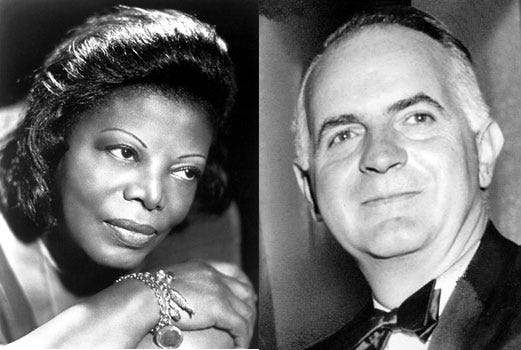Black Coffee
#40 / Feb. 18 Podcast
It was 1948 and band leader/composer/arranger Sonny Burke published a song that would revamp careers for several singers, give radio a powerful pre-rock ’n’ roll summer hit and almost fuel a legal battle that could have further divided an already fragmented post-World War II music community. The tune at the center of it all was the dark and simmering classic, “Black Coffee.”
It was the great Sarah Vaughan who first fell under the song’s spell. At about that time, her career was in serious need of a boost. A prolonged musicians’ union ban was threatening to bankrupt The Divine One’s little label, Musicraft; she used her missed royalty payments as an excuse to bail out and sign with the much larger Columbia label. Columbia then needed a big number to introduce its new star. Vaughan’s resulting recording of “Black Coffee” sizzled all through the summer days of ’49.
Soon others were taking sips of the same brew. Over at Decca, for instance, “Black Coffee” would become the title tune of the first album by Peggy Lee. Sure, she had been recording professionally since joining the Benny Goodman Orchestra in 1941, but until then she had released only singles. Years later, incidentally, singer/songwriter Joni Mitchell declared Peggy Lee’s “Black Coffee” one of her all-time favorite albums.
Near Legal Fight
The post-WWII jazz world was already divided. Members of the old guard — Dixielanders, big band and swing era players and other mainstream musicians — were being squeezed by all those new cats with their bebop, hard bop, West Coast sounds and birth of the cool. The situation really didn’t need lawyers to join the fray. Still, “Black Coffee” didn’t go down so well it some quarters of the music community.
Artists quickly noticed that the first two measures of Sonny Burke’s composition were nearly identical to jazz composer Mary Lou Williams’ 1938 piece, "What's Your Story Morning Glory.” Williams believed Burke plagiarized her composition and reportedly considered taking legal action over the matter. While lawsuits ultimately didn’t materialize, the resentment didn’t really go away.
(Actually, both Williams’ and Burke’s tunes share melodic motifs drawn from blues, including a strong melodic emphasis on the flatted third and flatted seventh intervals, known as “blue notes.” And, as Wikipedia notes, the two songs have significant melodic and rhythmic differences after the first two measures of their respective “A” sections, and "Black Coffee" has a unique bridge section that has no parallel in "Morning Glory.”)
The Coffman Connection
In our world, “Black Coffee” is in a much happier place, because it is a sweet connection between the Family Flood and the wonderful Coffman family, a brilliant young household of musicians and artists, students and teachers.
We feel so fortunate to know them through the transformative playing of their eldest. Each week 21-year-old Vaness Coffman, our newest Floodster, plays music that takes our ears to brand new places.
Now, when Veezy plays her solo jazz sets at venues around our area, she often mentions that every member of her family has a favorite song, and if you’re lucky, she’ll play them for you sometime during that night.
High on our list from that collection is her mom’s favorite. Julianne Coffman teaches music in the Cabell County schools and her Veezy tune is this same 1948 jazz standard.
So here it is, from last night’s Flood gathering: Click here to hear our take on “Black Coffee.”
Want More of the Veezy Vibe?
By the way, if you’d like more Veezy Coffman tunes, check out the Veezy Channel on the free Radio Floodango music streaming feature, by clicking right here.









'Dark and sizzling' is the perfect description. Veezy's sax showcases every brooding nuance of this old standard. Wonderful!